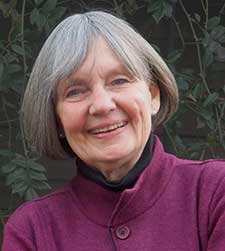Remembering Pauline Maier by Gordon Wood

Photograph courtesy of Andrea Maier.
Pauline Maier served on the Council of the Omohundro Institute from 1981 to 1984.
- Remembering Pauline Maier by Rick Beeman
- Remembering Pauline Maier by Richard Bernstein
- Remembering Pauline by Joanne Freeman
- Remembering Pauline Maier by Christopher Jedry
- Remembering Pauline Maier by Gary Kornblith
- Remembering Pauline Maier by Rob Martello
- Remembering Pauline Maier by Mary Beth Norton
- Remembering Pauline Maier by Ray Raphael
- Remembering Pauline Maier by Gordon Wood
Remarks delivered on October 29, 2013, at the MIT celebration of the life of Pauline Maier
I knew Pauline for 50 years, going back to graduate school. And because we worked on similar issues in the Revolutionary era, we were often put together on many committees, programs, and conferences. Just last fall we had a conversation on the Anti-Federalists in front of 400 school kids at Faneuil Hall in Boston. She was asked by several trial lawyers in Boston who sponsor a yearly lectureship for Massachusetts high school students. The lawyers wanted two people, and Pauline asked me. She told me weren’t getting paid. I did it only because it was Pauline who asked me. She was that kind of generous person.
Instead of back to back lectures, which is what the lawyers wanted, we suggested a conversation between the two of us. We had a wonderful time talking with each other and with the students. The trial lawyers invited us to dinner at the Union Club, along with about 40 other lawyers and judges who scarcely had any idea of why we were there. The lawyers presented us each with two identical ball point pens, presumably, as Pauline sardonically said to me, one for each hand. One of the teachers present asked us if we would come to his school this fall. We were supposed to repeat our conversation in front of students at his school yesterday.
Pauline was not only a kind and generous person, she was as well a great historian. You all know of her books, each of which has profoundly influenced the way we look at the Revolutionary era. She had the rare talent of being able both to advance the discipline and at the same time reach a general reading public. Having her books accessible to a general reading public was something she was proud of and wished more of her colleagues in the profession cared about. Shortly after her magnificent narrative history of the ratification of the Constitution was published, the William and Mary Quarterly held a forum on her book. In the forum several of her fellow academics criticized Maier for not mentioning Charles Beard in her book. I know she was exasperated by such comments, and she simply sighed at the inability of her critics to understand what she was doing in writing a narrative history that would appeal not just to academic historians but to a general reading public. None of the participants in the ratification debates that took place over 200 years ago, she politely pointed out in the Forum, ever mentioned Charles Beard.
Pauline was no ordinary historian. She was not just a great historian, she was a historian’s historian. She had no present-minded agenda to promote. She was always the extreme contextualist, eager to recover the past as it was actually lived, not as we want to remember or to use it.
A lot has been made of her off-hand remark that Jefferson was the most over-rated person in American history. What she meant by that remark was that Jefferson’s role in writing the Declaration of Independence has been grossly exaggerated. He was not the author of the Declaration, as he later claimed; he was the committee’s draftsman. It was during the 1790s that his Republican followers created the image of Jefferson as the author of the Declaration. John Adams was beside himself with jealousy. If he had known the future, he surely would have written it himself. Even Jefferson was surprised by the acclaim given him as the author. He wrote his daughter telling her to save the desk on which he written the Declaration. It will be a relic, he said.
Pauline wanted to set the Declaration in the context of 1776, not 1796, or 1860, or 1963. It came out of what she called the “the grubby world of eighteenth-century American politics.” By uncovering at least ninety different declarations of independence that Americans in their various localities adopted between April and July of 1776, she demonstrated, in a way that no one else ever had, that Jefferson’s Declaration was not unusual or peculiarly inspirational. Indeed, far from being some sort of sacred scripture, setting forth “basic principles for the guidance of an established society,” it was, as she put it, just “a workaday document of the Second Continental Congress.” She was, as I say, a historian’s historian. By strictly stressing the pastness of the past, Pauline wanted our memory of the past to be as free of distortions and as honest as possible. She carried her dedication to the contextualist history, to the pastness of the past to the point where she even criticized Abraham Lincoln and Martin Luther King, Jr., for the ways they embellished and refashioned the original character of the Declaration to fit their needs.
You may recall the ending of the John Ford movie, The Man Who Shot Liberty Valence, when the newspaper editor is asked about the discrepancy between the facts and the legend. He said “when the legend becomes fact, print the legend.” Pauline didn’t believe that. She wanted the original facts printed, not the legends.
Pauline was the ultimate critical historian. Since the tendency of every society is to allow memory to overwhelm the accuracy of the past, we need great critical contextualist historians like Pauline to keep us honest. We miss her now, and will continue to miss her.
Gordon Wood
Brown University
